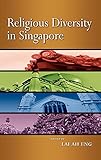Religious Diversity in Singapore / ed. by Ah Eng Lai.
Material type: TextPublisher: Singapore : ISEAS Publishing, [2008]Copyright date: ©2008Description: 1 online resource (784 p.)Content type:
TextPublisher: Singapore : ISEAS Publishing, [2008]Copyright date: ©2008Description: 1 online resource (784 p.)Content type: - 9789812307545
- 9789812307552
- 200.95957 22
- online - DeGruyter
| Item type | Current library | Call number | URL | Status | Notes | Barcode | |
|---|---|---|---|---|---|---|---|
 eBook
eBook
|
Biblioteca "Angelicum" Pont. Univ. S.Tommaso d'Aquino Nuvola online | online - DeGruyter (Browse shelf(Opens below)) | Online access | Not for loan (Accesso limitato) | Accesso per gli utenti autorizzati / Access for authorized users | (dgr)9789812307552 |
Frontmatter -- CONTENTS -- LIST OF FIGURES AND TABLES -- LIST OF APPENDICES -- FOREWORD -- PREFACE -- ACKNOWLEDGEMENTS -- THE CONTRIBUTORS -- ABBREVIATIONS -- GLOSSARY -- INTRODUCTION -- I. THE LANDSCAPE OF RELIGIOUS DIVERSITY -- 1. Religious Influences and Impulses Impacting Singapore -- 2. Religious Trends and Issues in Singapore -- 3. Keeping God in Place: The Management of Religion in Singapore -- 4. Discourses on Islam in Southeast Asia and Their Impact on the Singapore Muslim Public -- 5. Global Christian Culture and the Antioch of Asia -- 6. “Religiously-inspired”, “India-derived” Movements in Singapore -- 7. Baha’is in Singapore: Patterns of Conversion -- 8. Diversities and Unities: Towards a Reformist Buddhism in Singapore -- 9. The Sathya Sai Baba Movement in Singapore: Its Service Mission and Philosophy of Communal Identity Construction -- 10. The Muslim Religious Elite of Singapore -- 11. The Evolution of the Sikh Identity in Singapore -- 12. Religious Processions: Urban Politics and Poetics -- II. RELIGION IN SCHOOLS AND AMONG THE YOUNG -- 13. From Moral Values to Citizenship Education: The Teaching of Religion in Singapore Schools -- 14. Religious Education as Locus of Curriculum: A Brief Inquiry into Madrasah Curriculum in Singapore -- 15. Mission Schools in Singapore: Religious Harmony, Social Identities, and the Negotiation of Evangelical Cultures -- 16. Religious Switching and Knowledge among Adolescents in Singapore -- III. RELIGION IN THE MEDIA -- 17. Religious Reasons in a Secular Public Sphere: Debates in the Media about Homosexuality -- 18. The Internet and Religious Harmony in Singapore -- IV. RELIGIOUS ORGANIZATIONS IN SOCIAL SERVICES -- 19. Muslim Organizations and Mosques as Social Service Providers -- 20. Hindu Temples in Charities and Social Services -- 21. Delivering Welfare Services in Singapore: A Strategic Partnership between Buddhism and the State -- 22. Saving the City through Good Works: Christian Involvement in Social Services -- V. INTERFAITH ISSUES AND INTERACTION -- 23. Religious Diversity, Toleration and Interaction -- 24. Negotiating Christianity with Other Religions: The Views of Christian Clergymen in Singapore -- 25. The Inter-Religious Organization of Singapore -- 26. Interactions among Youth Leaders of Different Faiths: Realities from the Ground and Lessons Learnt -- 27. Building Bridges between Christians and Muslims: A Personal Journey -- 28. Conclusion: Some Remarks on Religious Diversity in Singapore -- INDEX
restricted access online access with authorization star
http://purl.org/coar/access_right/c_16ec
Religious and ethno-religious issues are inherent in many multiethnic and multi-religious societies. Singapore society is no exception. It has long been multiethnic, multicultural and multi-religious, being at the crossroads of many major and minor civilizations, cultures and traditions, and its religious diversity continues to develop in the current contexts of growing religiosity, religious change and conflict often in the name of religion. Despite this background, there is lack of in-depth knowledge, nuanced understanding and regular dialogue about religions and the meanings of living in a multi-religious world. This volume covering major themes of Singapore's religious landscape, religion in schools and among the young, religion in the media, religious involvement in social services, and interfaith issues and interaction fills important gaps in the knowledge and understanding of Singapore’s religious diversity and complexity. A collective effort of researchers and practitioners, it is a timely and useful reference for scholars, decision-makers, leaders and practitioners as well as for concerned citizens and followers.
Mode of access: Internet via World Wide Web.
In English.
Description based on online resource; title from PDF title page (publisher's Web site, viewed 01. Dez 2022)


